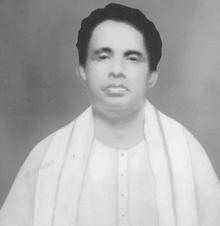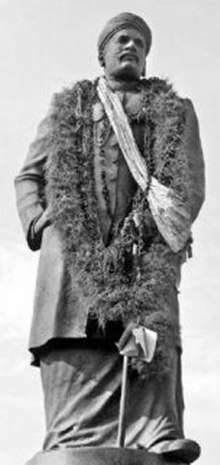Vagbhatananda
Vagbhatananda (27 April 1885 – 29 October 1939) was a Hindu social reformer in British India. He was the founder of the Atmavidya Sangham, which was fundamentally a group of professionals and intellectuals who sought change and eradicated social evils and superstitions.The movement he spearheaded played an important role in the Kerala reformation movement.

Vaghbhadananda | |
|---|---|
| Born | Vayaleri Kunhikkannan Gurukkal 1885 |
| Died | October 1939 |
Life
Vagbhatananda was born on 1885 April 27 in Pattiam desham near to Tellicherri in Kerala, India. He was given the name V. K. Gurukkal and was of the Thiyya community. He was educated in the traditional gurukkal system, through which he gained proficiency in scriptures and philosophy. He came to Calicut in the year 1905 as a sanscrit teacher, got attracted to the non-idolarity and atheistic reform activities of Dr.Ayyathan Gopalan ,a great social reformer of that time in Kerala, Leader and Propagandist of Brahmosamaj (1898) and founder of Sugunavardhini movement(1900) in Kerala, and started involving in the social activities with him.
Sree Narayana Guru, contemporary of Dr. Ayyathan Gopalan and Vaghbhatananda started temple construction and consecration of idols to make people co-operative. As a part of it, his followers made attempt to construct temples. In 1910, at Kozhikode under the leadership of some elites of the community, efforts were started to build the Sree Khandeshwaram Temple. Brahmananda Sivayogi was invited to deliver a speech against the proposed construction of the temple. During his association with Brahma Samaj he had rationally opposed idolatry and it was due to this, he was invited by Dr. Ayyathan Gopalan, a Brahmo samaj activist. The venue was the Kozhikode Town Hall. Many people arrived in order to query the speaker. Orthodox Hindus decided to stop it at any cost. They asked him whether there is a need to oppose idol-worship which had acceptance from the ancient times itself. Brahmananda Sivayogi the rational yogi argued, with excerpts from the religious texts, that "idol-worship had no approval during the olden times". His speech wiped out the ignorance of many. He also answered and established, with the help of passages from authoritative texts, that RajaYoga was possible for everyone. By this speech he got appreciation for his progressive ideas and plans for implementation against idolatry, and also gained a wide following of disciples in different parts of Malabar, Vaghbhatananda had gone to hear the speech of Sivayogi as a representative of Brahmosamaj and Dr. Ayyathan Gopalan. After hearing his speech he became attracted to swami's oratorial abilities and the Anandamatha and Rajayoga meditation and joined Brahmananda Sivayogi as his disciple. Brahmananda Swami Sivayogi was the one who named him as "Vaghbhatananda" seeing his oratorical abilities. Later on Vaghbhatananda started his own activities by disagreeing with some views of Sivayogi. He travelled widely to propagate "the teachings of universal non-duality for a better and egalitarian society.
In 1906 Vagbhatananda founded Thatwaprakashika Sanskrit school teaching Sanskrit in Calicut
In 1917, Vagbhatananda founded the Atmavidya Sangham, whose principles he outlined in an Advaita Vedanta treatise titled Atmavidya.[1] Unlike the Sree Narayana Dharma Paripalana (SNDP), which had been established by Narayana Guru and was significant around the same time, the Atmavidya Sangham comprised mostly professional and intellectual people and it had a more secular approach to reform.[2] It was instrumental in advancing the development of class organization among peasants of the region, spreading socialist ideas as a counter to the overbearing feudal and religiously orthodox establishment. Vagbhatananda himself criticized both economic exploitation and the role of foreign governments in supporting it.[3]
Vagbhatananda, who was married, died on October 29, 1939. Kurup has described him as a "good combination of an erudite scholar, reformer, organizer, journalist and nationalist. ... His authority was the ancient wisdom of Hinduism, not the dogmatism of theology." [4] The significance of the Atmavidya Sangham declined after his death, being superseded by other secular-oriented reform groups such as the Karshaka Sangham that adopted its agenda. However, it was still active in the 1980s.[2]The Uralungal Labour Contract Co-operative Society (ULCCS), one of the largest labor contract societies in India today, is a group started by fourteen Chalayil Kunjayak gurus.
He left for his heavenly abode on 29 October 1939 at the age of 54.
See Also:[edit]
References
Citations
- Kurup (1988), p. 94
- Kurup (1988), pp. 98-99
- Kurup (1988), p. 97
- Kurup (1988), pp. 94, 97
Bibliography
- Kurup, K. K. N. (1988), Modern Kerala: Studies in Social and Agrarian Relations, Mittal Publications, ISBN 9788170990949
- Shepherds' Chalet, Shepherds' Chalet, Shepherdschalet.com, retrieved 19 March 2014
Further reading
- Kurup, K. K. N. (September 1988). "Peasantry and the Anti-Imperialist Struggles in Kerala". Social Scientist. 16 (9): 35–45. doi:10.2307/3517171. JSTOR 3517171.
